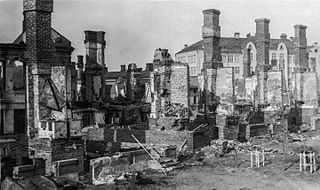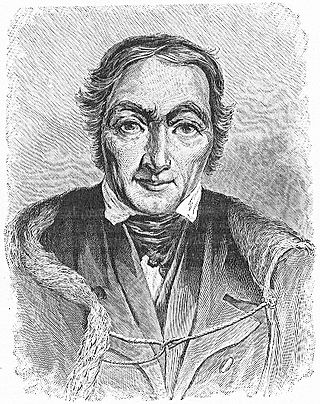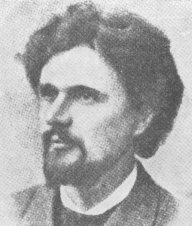
The Finnish Civil War was a civil war in Finland in 1918 fought for the leadership and control of the country between White Finland and the Finnish Socialist Workers' Republic during the country's transition from a grand duchy ruled by the Russian Empire to a fully independent state. The clashes took place in the context of the national, political, and social turmoil caused by World War I in Europe. The war was fought between the Red Guards, led by a section of the Social Democratic Party, and the White Guards, conducted by the senate and those who opposed socialism with assistance late in the war by the German Imperial Army at the request of the Finnish civil government. The paramilitary Red Guards, which were composed of industrial and agrarian workers, controlled the cities and industrial centres of southern Finland. The paramilitary White Guards, which consisted of land owners and those in the middle and upper classes, controlled rural central and northern Finland, and were led by General C. G. E. Mannerheim.

A utopia typically describes an imaginary community or society that possesses highly desirable or near-perfect qualities for its members. It was coined by Sir Thomas More for his 1516 book Utopia, which describes a fictional island society in the New World.

The White Guard, officially known as the Civil Guard, was a voluntary militia, part of the Finnish Whites movement, that emerged victorious over the socialist Red Guards in the Finnish Civil War of 1918. They were generally known as the "White Guard" in the West due to their opposition to the "communist" Red Guards. In the White Army of Finland many participants were recruits, draftees and German-trained Jägers – rather than part of the paramilitary. The central organization was named the White Guard Organization, and the organization consisted of local chapters in municipalities.

Robert Owen was a Welsh textile manufacturer, philanthropist, political philosopher and social reformer, and a founder of utopian socialism and the co-operative movement. He strove to improve factory working conditions, promoted experimental socialistic communities, sought a more collective approach to child-rearing, and 'believed in lifelong education, establishing an Institute for the Formation of Character and School for Children that focused less on job skills than on becoming a better person'. He gained wealth in the early 1800s from a textile mill at New Lanark, Scotland. Having trained as a draper in Stamford, Lincolnshire he worked in London before relocating at age 18 to Manchester and textile manufacturing. In 1824, he moved to America and put most of his fortune in an experimental socialistic community at New Harmony, Indiana, as a preliminary for his utopian society. It lasted about two years. Other Owenite communities also failed, and in 1828 Owen returned to London, where he continued to champion the working class, lead in developing co-operatives and the trade union movement, and support child labour legislation and free co-educational schools.

An intentional community is a voluntary residential community designed to foster a high degree of social cohesion and teamwork. Members typically unite around shared values, beliefs, or a common vision, which may be political, religious, spiritual, or simply focused on the practical benefits of cooperation and mutual support. While some groups emphasise shared ideologies, others are centred on enhancing social connections, sharing resources, and creating meaningful relationships.

The Academic Karelia Society was a Finnish nationalist and Finno-Ugric activist organization aiming at the growth and improvement of newly independent Finland, founded by academics and students of the University of Finland in 1922. Its members retained influential positions in the academic life of the era as well as within the officer corps of the Army. The AKS controlled the student union of the University of Helsinki from the mid-1920s right up to 1944, when the Society was disbanded in the aftermath of the Continuation War.

Finnish Canadians are Canadian citizens of Finnish ancestry or Finns who emigrated to and reside in Canada. In 2016, 143,645 Canadians claimed Finnish ancestry. Finns started coming to Canada in the early 1880s, and in much larger numbers in the early 20th century and well into the mid-20th century. Finnish immigration to Canada was often a direct result of economic depressions and wars, or in the aftermath of major conflicts like the Finnish Civil War. Canada was often chosen as a final destination because of the similarity in climate and natural conditions, while employment in logging or homesteading attracted landless farmers in the early 20th century. Migratory movements of Finns between Canada and the United States was very common as well.

Owenism is the utopian socialist philosophy of 19th-century social reformer Robert Owen and his followers and successors, who are known as Owenites. Owenism aimed for radical reform of society and is considered a forerunner of the cooperative movement. The Owenite movement undertook several experiments in the establishment of utopian communities organized according to communitarian and cooperative principles. One of the best known of these efforts, which was unsuccessful, was the project at New Harmony, Indiana, which started in 1825 and was abandoned by 1827. Owenism is also closely associated with the development of the British trade union movement, and with the spread of the Mechanics' Institute movement.
Parliamentary elections were held in the autonomous Grand Duchy of Finland on 15 and 16 March 1907. They were the first parliamentary election in which members were elected to the new Parliament of Finland by universal suffrage and the first in the world in which female members were elected.

The Socialist Party of Oregon (SPO) is the name of three closely related organizations — an Oregon state affiliate of the Social Democratic Party of America established in 1897 and continuing into the 1950s, as well as the Oregon state affiliate of the Socialist Party USA from 1992 to 1999.

Teuvo Peltoniemi is a Finnish writer, journalist, researcher, educator, and eHealth developer specialized on addictions. Since the 1970s he has been contributing by research and journalism to increase public awareness in Finland for many taboo societal problems, like general speed limits, family violence, sexual abuse of children, situation of children of alcohol abusing parents, and net addiction. After retirement he now writes about social issues in his blog at Iltalehti evening paper, and in science journals and books as well as maintains two sites on the Finnish Utopian Communities.

Sulo Arvi Pohjanpää was a Finnish Olympic gymnast, judge and writer.

Johan Verner Weckman was a wrestler who was the first Finnish Olympic gold medalist.

Matti Kurikka was a Finnish journalist, theosophist, and utopian socialist.
The World a Department Store: A Story of Life Under a Coöperative System is a utopian novel written by Bradford C. Peck, and published by him in 1900. The book was one entrant in the wave of utopian and dystopian writing that occurred in the late nineteenth and early twentieth centuries. Moreover, Peck's book was one of the minority of utopian works of the time that was linked to an effort at practical application of its ideas.
Irreligion in Finland: according to Statistics Finland in 2020, 29.4% of the population in Finland were non-religious, or about 1,628,000 people. The Union of Freethinkers of Finland and other organisations have acted as interest organisations, legal protection organisations and cultural organisations for non-religious people. In a 2018 international ISSP survey, 40% of the Finnish population said they did not believe in God, 34% said they believed in God and 26% did not know. Nearly one out of every five people in the country is not a member of a religious organisation, and the number of people with no religious affiliation has doubled in two decades.
Finnish Argentines are Argentine citizens of full, partial, or predominantly Finnish ancestry, or Finnish-born people residing in Argentina.

Lempi Ikävalko was a Finnish writer, poet, actress and performance artist. She spent much of her adult life as a journalist in the United States but she strongly identified with her roots in Karelia—in Finnish, Karjala, the region considered the cradle of Finnish mythology because the Kalevala, the national epic poem, came from there.

Teo Kaarlo Snellman was a Finnish Nazi, embassy counselor, translator, and vegetarian. From 1940 to 1944, Snellman headed the Finnish National Socialist Labor Organisation. Snellman was the grandson of Johan Vilhelm Snellman. Teo considered his grandfather Johan Vilhelm and Eino Leino, Väinämöinen and Mikael Agricola to be Finland's first National Socialists.
The Prometheus Society was a Finnish student society at the University of Helsinki from 1905 to 1914, whose main purpose was to promote religious freedom.















